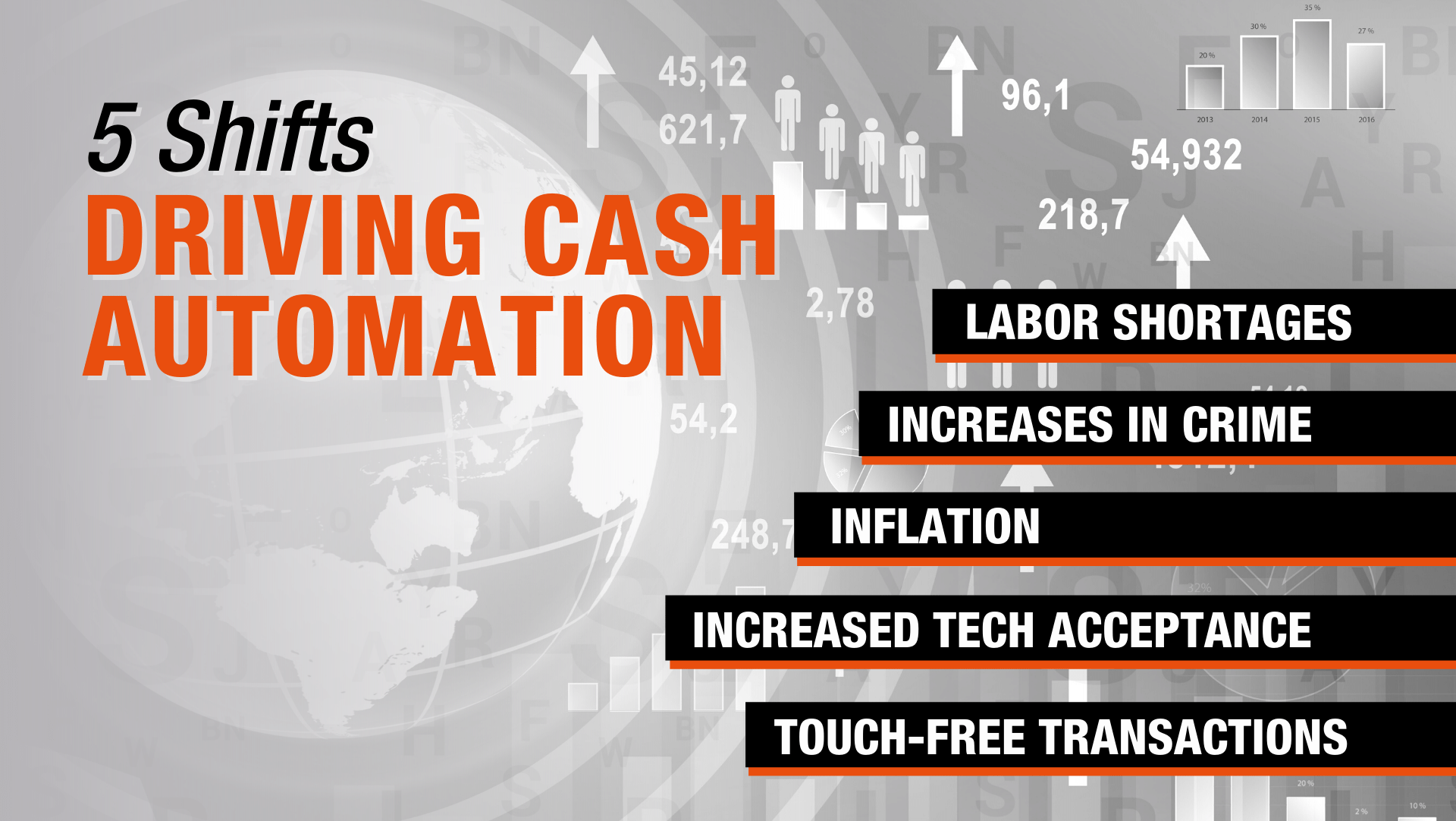The U.S. economy is struggling to recover after more than two years of upheaval. As the pandemic recedes, the nation faces several social and economic shifts. These changes will steer the direction of commerce and shape our new normal. Hospitality, fast food, gaming, grocery, cannabis, and retail banking outlets must pivot to accommodate new customer and worker behaviors. Here are five shifts driving cash automation:
Labor Shortages
In the latter half of 2021, the “Great Resignation” rippled across many sectors. The phenomenon decimated lower-paying hospitality and retail jobs. By the time the dust settled, over 1 million hospitality workers and nearly 5% of retail workers had quit. Retailers report that it is now almost impossible to hire enough staff to keep up with business.
The cash automation solution:
Retailers can deploy cash automation machines quickly and fill many of these menial jobs. Front-of-house transactions and backroom counting activities are more reliable, accurate, and faster when done by machines. Cash handling devices such as recyclers, smart safes, and kiosks remove the unpredictability of human labor and reduce employment costs. Businesses can offer better wages to a much smaller workforce while improving the bottom line.
Increases in Crime
From coast to coast, criminal activity is increasing at an alarming rate. Businesses are reporting a surge in crimes from armed robbery to cash shrink from employees. Even counterfeit operations are in high gear, churning out near-perfect reproductions of U.S. banknotes.
The cash automation solution:
Cash automation machines act as deterrents to criminal activity in many ways. Armed robbers don’t want to risk the time needed to break into smart safes, cash recyclers, or kiosks. These machines accurately track money flow inside the business, allowing managers to see which employee used the machine, total transactions, and total cash deposited or withdrawn. Shrink from theft or human error is immediately visible. Built-in scanners also detect counterfeit notes and separate them for removal.
Inflation
Although financial experts proclaimed that inflation would be transitory, it has surged to historic levels with little relief in sight. Everything from materials to labor is more expensive than ever before.
The cash automation solution:
Cash recycling hardware is a fixed investment that will last for many years. A self-service kiosk will not ask for a raise or drive up health insurance premiums. Automating all cash handling activities is a wise investment that will quickly pay for itself.
Increased Tech Acceptance
The pandemic sped up the acceptance of automation, self-service, and technology in retail spaces. Customers and workers are less resistant to using machines to complete transactions. Even older Americans have become accustomed to using technology to make purchases. Retail outlets that do not recognize this shift in consumer attitudes may get left behind.
The cash automation solution:
By now, most consumers are familiar with the process of using a point of sale kiosk. Many people prefer the self-service option. These customer-facing kiosks require fewer tellers to oversee transactions, saving money without diminishing service. Workers can spend more time on high-value activities such as interacting with customers or upselling merchandise.
Touch-Free Transactions
Many nations worldwide are beginning to look at Covid as endemic instead of pandemic and are adjusting their regulations accordingly. However, many of the lessons and habits from the pandemic may take time to recede. Regular cleaning of surfaces, aversion to contact, and a preference for “touch-free” options will likely remain for some time.
The cash automation solution:
Certain customers may continue to avoid excessive touchpoints, particularly during the annual cold and flu season. Customer-facing kiosks and self-service checkout stations give customers and workers a touch-free option to complete their transactions.




